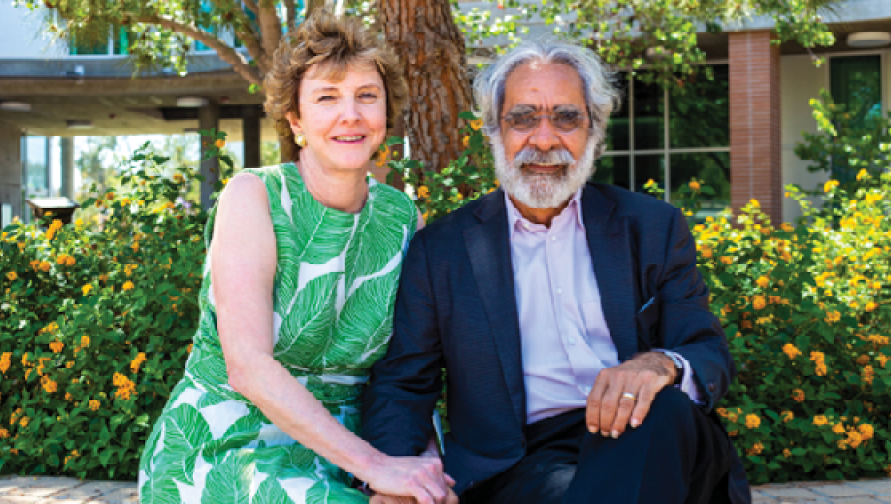
By Lori Basheda
Ara Apkarian, Distinguished Professor of chemistry at the University of California, Irvine, is known in scientific circles as a groundbreaking chemist who, for instance, led the team that captured the first-ever moving images of a molecule breathing, by shifting from one quantum state to another. In Orange County circles, he and his wife Alice are also known for their generosity.
The Apkarians recently funded a $100,000 endowment to support graduate student research awards in the UCI Armenian Studies Program, which is housed in the School of Humanities. The award bears the name of their daughter, Naneh, who recently earned her doctorate in math education and is now a post-doctoral researcher at Western Michigan University.
The Naneh Award for Graduate Research in Armenian Studies is the second significant gift the Apkarians have bestowed on the university's School of Humanities. The first one ($100,000 in 2015) helped establish the Meghrouni Family Presidential Chair in Armenian Studies.
Apkarian is a foreign member of the Armenian National Academy of Science and the director of the Center for Chemistry at the Space-Time Limit. Given his professional and personal investment in the advancement of the sciences, what motivates his generosity to Armenian studies at UCI?
"For one thing,” Apkarian says, "graduate students in the sciences invariably receive full financial support throughout their graduate careers, which allows them to focus on their studies." Both Apkarian and his wife, a retired adjunct chemistry professor at Saddleback College, relied on stipends and fellowships while they were pursuing their doctorates at Northwestern in the '70s.
"But graduate student support in Armenian studies? That's a much tougher sell,” he says, laughing. "We have to do it."
Apkarian is Armenian. His grandparents fled Turkey during the genocide of 1915 and walked the desert to safety in northern Syria, where his parents were born. He grew up in Beirut, Lebanon, which at that time was known as the "Paris of the East."
"I have tremendous nostalgia,” he says.
In 1973, at age 17, he came to America to study at USC.
“Education was a given in our society,” he says. “That was your only way to advance.”
A year later, the civil war broke out back home in Lebanon "and then there was utterly no reason to go back."
He went on to pursue his Ph.D. at Northwestern. That's where the two of them met. The couple went on to Cornell for post-doctoral training and returned to Southern California when Apkarian was hired at UCI in 1983.
Five years later, the couple had their daughter. They named her Naneh (Nané) after the goddess of war and wisdom in ancient Armenian mythology. The goddess is often depicted with a shield and spear like the Greek Athena.
"Being Armenian is very important to our daughter," she says. "And it's very important to me. It’s my adopted culture."
Southern California has the largest Armenian diaspora in this country, a population of over a half million by some estimates. The Western Armenian culture and language is distinct from that of their home country, the Republic of Armenia, which gained independence from the Soviet Union in 1991.
"And that culture, because it does not have the oversight of a government, has to be perpetuated by churches, community organizations and, of course, learning centers," Apkarian says. "We want to make sure that Western Armenian culture and language thrive."
Armenian culture dates back thousands of years, with a rich tradition of arts, science, literature, cuisine and customs. At the same time there are few advanced Armenian studies programs, perhaps a dozen chairs in the entire country, Apkarian believes.
When, in 2015, the Apkarians learned that UCI was launching a campaign to seed its Armenian Studies Program, they picked up the phone to say they were in. Apkarian also joined the Armenian Studies Advisory Committee, which works in concert with the university to help facilitate communication and participation with the Armenian community beyond the confines of the campus.
"We both came from families who thought you should be supporting your communities and the greater community of the world," she says. "Over the years we have supported multiple passions close to our hearts."
The couple's latest donation is simply "an appreciation of what is valuable in life," he says. "Being the products of graduate studies, we know what it takes and what it means. It is very difficult to carry out graduate studies without financial support. That's something the general public doesn't appreciate. The idea here is to enable graduate students to focus on their work."
The Naneh Award will provide partial support of a graduate student starting this fall. The Apkarians are hoping their gift will inspire others to join them. They say a series of awards named after the Armenian Pantheon, such as Aramast, Naneh’s Dad; Anahit, Goddess of Fertility; and Deer, the God of writing, has a nice ring to it.
Related links:
